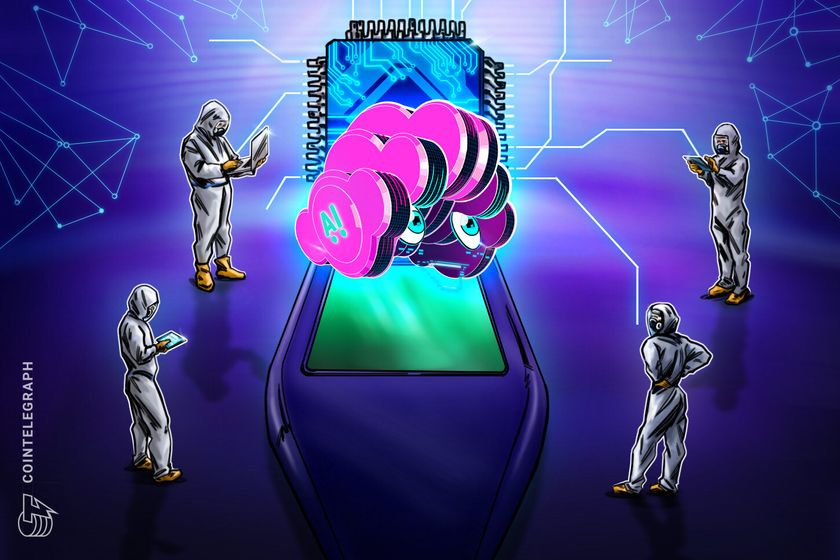
Industry figures disagree on whether GameFi is having a good year as other aspects of Web3 hog the spotlight.
Gaming’s intersection with finance and crypto — also known as Gamefi — has been a bit of a mixed bag in 2024.
Voices from across the industry have spoken to Cointelegraph to deliver their verdicts on the current state of the GameFi industry — and their conclusions are far from unanimous.
In December 2023, Cointelegraph asked industry experts to predict what 2024 would bring for the sector, and now that we’ve passed the halfway mark, we’re revisiting the subject once more.

The country’s current progress appears to be on par with Elon Musk’s Neuralink.
China has created a committee to steer the nation’s development of brain-computer interfaces (BCIs) with the hope of becoming the global leader in brain chip technology.
The committee will reportedly develop nationwide standards for development in order to compete with western technology outfits such as Elon Musk’s Neuralink.
The term “brain-computer interface” (BCI) was coined in the early 1970s. A BCI refers to any device that translates the brain’s signals into language that can be interpreted by a computer.

The partial dismissal indicates complainants failed to demonstrate that GitHub reproduces human-created code.
The judge overseeing a billion-dollar class action lawsuit against GitHub, OpenAI, and Microsoft over the alleged unauthorized use of intellectual property (IP) to train the “GitHub Copilot” artificial intelligence (AI) coding software has partially dismissed the claims against the defendants.
This marks a win for big tech and the generative AI industry, which currently faces a number of related lawsuits.
The lawsuit’s complainants had alleged that OpenAI “scraped” GitHub and used human-created coding snippets to train GitHub Copilot without permission, compensation, or credit. According to the lawsuit, Copilot reproduced human-generated code line-for-line and, as such, the complainants were apparently seeking compensation in the amount of $1 billion.

The problem has since been resolved, but it begs the question of how such an oversight happened in the first place.
The partnership between Apple and OpenAI is off to a rocky start as ChatGPT users on macOS recently learned their conversations were being stored in plain-text files.
Apple has positioned itself as a company that prioritizes privacy in a market where many of its competitors reap a lion’s share of their profits by selling or repurposing user data. But, as demonstrated by data and electronics engineer Pedro José Pereira Vieito in a post on Meta’s Threads, somebody dropped the ball when it came to OpenAI’s third-party integration of ChatGPT on macOS.
ChatGPT was released on macOS in May to subscribers. General access for non-subscriber accounts was made available on June 25. Until Friday, July 5, however, the app stored all chat logs in unencrypted plain-text files on users’ hard drives.

The reasons ranged from cannibalizing their own businesses to releasing potentially inferior products.
Over a dozen of the biggest names in the United States technology industry have filed “risk factor” reports with the Securities and Exchange Commission (SEC) indicating that artificial intelligence (AI) could threaten company finances.
While not uncommon, these risk reports outline internal thinking when it comes to the potential pitfalls of dedicating resources and funds to the development of nascent technologies such as AI.
Those filing warnings, according to a report from Bloomberg, include Adobe, Dell, Google, Meta, Microsoft, Nvidia, Oracle, Palo Alto Networks, Uber and at least a few others.

Softbank Group stocks reached an all-time-high on a market capitalization of $97.2 billion.
Softbank Group Corporation’s stock rose 1.5% to reach an all-time-high on Tuesday, July 2. The high mark comes just a few years after the company saw its shares plummet amid the closure of numerous high-profile tech startups, including WeWork, and a tech sector crackdown by the Chinese government.
Analysts have largely attributed the Japanese company’s recent uptick to its pivot toward artificial intelligence and the performance of its computing subsidiary Arm Holdings.
As Cointelegraph recently reported, company founder and chairman Masayoshi Son recently announced that Softbank would pursue greater involvement in artificial intelligence (AI) technologies.

U.S. tech firms made huge commitments to “net zero” carbon emissions — but that was before ChatGPT hit the scene.
Big Tech’s carbon footprint continues to balloon as generative artificial intelligence products and services proliferate, with Amazon alone producing more carbon dioxide emissions per year than all the Bitcoin mining in the world.
According to the data, Big Tech has released more carbon dioxide into the atmosphere since 2019 — when most of the largest U.S. tech firms began disclosing their emissions — than Bitcoin has since 2014.
It’s virtually impossible to calculate the exact amount of carbon dioxide produced by Bitcoin operations throughout the globe. To the best of our knowledge, no research team has access to power grid usage and cost data from all the countries involved in Bitcoin mining.

The investment comes after a March commitment to spend $90 billion on a chip fabrication facility near Seoul.
SK Hynix, the second largest chipmaker in South Korea behind Samsung, will invest $74.6 billion over the next three years to develop memory chip technologies focused on artificial intelligence (AI).
Parent company SK Group will also seek to secure an additional $57.8 billion to further fund its AI endeavors by 2026, according to a report from Reuters.
Per the report, SK Group has “suffered heavy losses” as of late through both Hyinx and its vehicle battery subsidiary. The outsized investments, if the second is secured, will total nearly $133 billion — according to Companies Market Cap, Sk Hyinx alone only has a market capitalization of about $118 billion as of the time of this article’s publication.
 Zambia has reportedly initiated a process to establish an artificial intelligence framework and is collaborating with the Tony Blair Institute to formulate an artificial intelligence strategy. Sarah Luyele Njamu said Zambia can leverage AI for economic growth, improved healthcare, enhanced education, and sustainable development. Zambia Revising Cyber Security and Crime Law The Zambian government has […]
Zambia has reportedly initiated a process to establish an artificial intelligence framework and is collaborating with the Tony Blair Institute to formulate an artificial intelligence strategy. Sarah Luyele Njamu said Zambia can leverage AI for economic growth, improved healthcare, enhanced education, and sustainable development. Zambia Revising Cyber Security and Crime Law The Zambian government has […]

Artificial intelligence could deliver a fatal blow to the dream of Web3.
Artificial intelligence (AI) has the potential to usher in a new era of tools and technologies that will benefit people and their communities, creating new economic opportunities and accelerating creativity and innovation.
It also has the potential to do the opposite, building walls around closed-loop systems that strengthen existing corporate interests, eventually shutting out Web3 forever.
Chris Donovan, chief operating officer of Near Foundation, the governing body of the blockchain abstraction protocol, Near Protocol, told Cointelegraph what is troubling him and his fellow colleagues.